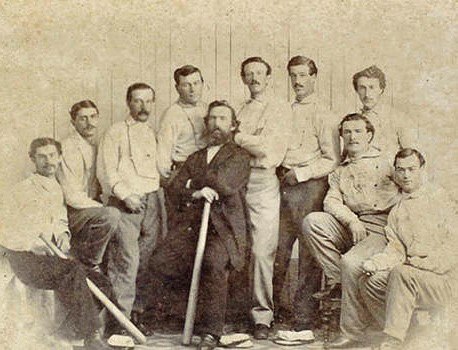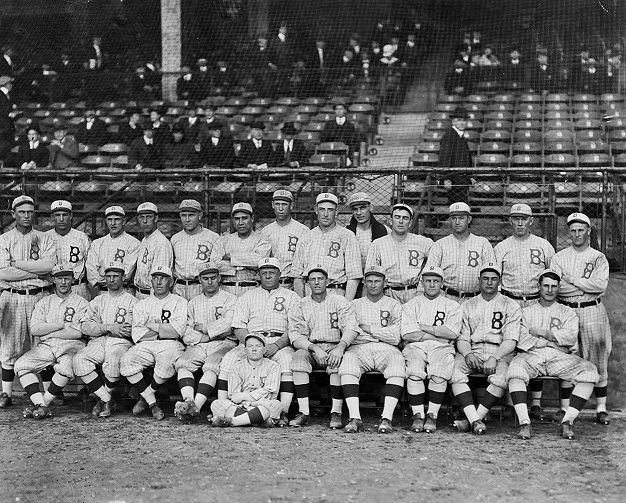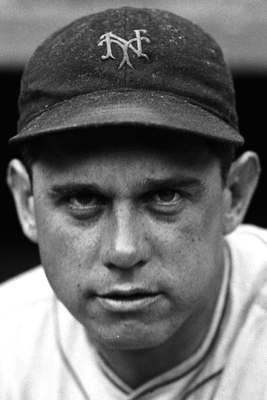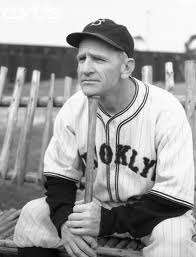I hate the Giants. I have always hated the Giants.
Why?
Because I’m a Dodger fan and they’re the Giants – it’s as simple as that.
And while the players, coaches and managers today may claim that the intense rivalry between the two teams is only a fan thing, the truth of the matter is that the Dodgers hate the Giants and the Giants hate the Dodgers – always have, always will.
But how did this rivalry begin? Or perhaps a better question is when did it begin? Here again, a simple answer – pretty much when baseball began. As for the how, here is the long and short of it:
In 1849, an amateur baseball club called the Atlantics was formed in the city of Brooklyn, New York. The Atlantics competed against the Excelsior, Putnam and Eckford clubs from across the eastern part of the country. So popular was this game of baseball becoming (especially in Brooklyn) that these four amateur clubs created what was called the National Organization of Baseball Players in 1857.
The Brooklyn Atlantics proved to be a very good club and were recognized as the national champions in 1864 and 1866. But perhaps their greatest accomplishment occurred in 1870 when they beat the Cincinnati Red Stockings in an exhibition game. The Red Stockings were the first professional team in baseball history, having begun “play for pay” a year earlier in 1869. The Red Stockings were unbeaten in 65 games as they toured the East and Midwest competing against amateur clubs. They would, of course, later become the Cincinnati Reds.
As fan support grew and with the help of a man named George Taylor, who was the city editor of the New York Herald, the Atlantics were able to get financial support from the city of Brooklyn and joined the newly formed American Association as a professional team in 1883 – thus, the Brooklyn Dodgers were born (although they wouldn’t be called that for several more years).
Also in 1883, John B. Day and Jim Mutrie, who owned the American Association’s New York Metropolitans (which was managed by Mutrie), decided to form a new National League team called the New York Gothams. On May 1, 1883, the Gothams played their first game at a field once used for polo matches at 110th Street and Sixth Avenue. The Gothams would go on to finish in sixth place with a 46-50 record in their inaugural season.
In 1885, Mutrie left the Metropolitans (or the Mets, as they were more commonly called) to manage the Gothams and on June 3, 1885 after an exciting extra-inning win over Philadelphia, Mutrie was so overcome with emotion that he reportedly blurted out a one-word description of his team that immediately became the franchise’s new nickname. That word, of course, was Giants. The rechristened Giants finished second in the National League, while the Mets slumped to seventh place in the American Association.
Prior to the 1886 season, Day and Mutrie sold the Mets to Erastus Wiman who moved the team to the St. George Cricket Grounds on Staten Island in hopes of promoting ferry trade across New York harbor. This business plan failed and the Mets ceased operation following the 1887 season. The failed team was purchased by the Brooklyn Atlantics to gain territorial protection and to acquire the contracts of several of the Mets’ star players.
In 1888 the city of New York evicted the Giants from the original Polo Grounds, forcing them to play two games at Oakland Park in New Jersey and 23 games back at the St. George Cricket Grounds before finally moving to yet another Polo Grounds located at 155th Street and Eighth Avenue, where they would remain for the next 69 years. In spite of the disruptions, the Giants finished the 1888 season with an 83-43 record – one game ahead of the Boston Beaneaters for the NL pennant. The Giants would go on to beat the pennant winners of the American Association in a Championship Series that would eventually be called the World Series. Who was that American Association team? The Brooklyn Atlantics, of course – thus one of baseball’s greatest rivalries was born.
In 1890 the Atlantics changed their name to the Brooklyn Bridegrooms, a moniker given them because several of their players had recently gotten married, and the team moved over to the National League. The Bridegrooms enjoyed immediate success by winning the NL pennant. A postseason series was played against the Louisville club who were the pennant winners from the American Association; however, the series was hampered by poor weather and long travel and ended in a tie.
On New Year’s Day 1898 New York City was born and Brooklyn became one of its five boroughs, however many Brooklynites still saw two things as belonging solely to them – the Brooklyn Bridge and their beloved Brooklyn Bridegrooms.
In 1899 the Bridegrooms changed their name to the Brooklyn Superbas and won the NL pennant. They followed that up by winning it again in 1900 to become the first team to win the NL pennant in the 20th century. Unfortunately, they would not win another until 1916. In between, the Superbas would become the Trolley Dodgers, the Dodgers and the Robins.
After a 16-year drought, the Robins finally won the NL pennant with record of 94-60 record to earn a trip to their first-ever World Series. After dropping Game 1 to the Boston Red Sox at home, the Robins scored a run in the first inning of Game 2, but failed to score again in a 14-inning pitchers duel against a 21-year-old left-hander by the name of George Herman “Babe” Ruth, who eventually won the game to give the Red Sox a 2-0 series lead. The Robins would bounce back to take Game 3 in Boston, but the Red Sox would take the next 2 games and won the series 4 games to 1.
While all of this was happening, across the bridge and under the leadership of eventual Hall of Fame manager John McGraw, the Giants dominated the National League. In fact, between 1883 and 1957, the Giants won 14 pennants, 4 NL championships (the predecessor to the World Series) and 5 World Series titles. On the other hand, the Dodgers (finally named as such for good in 1932) won 9 pennants (six of which were between 1947 and 1956), 3 NL Championships, and only one World Series title in 1955.
Yet in spite of their dismal history, the Dodgers had the most loyal fans in all of baseball and frequently led the league in attendance. And while such loyalty didn’t necessarily help the Dodgers, it most definitely hurt the Giants. Perhaps the best example of this occurred in 1934.
Prior to the start of the season, second-year Giants manager Bill Terry was being interviewed by a group of reporters. He was asked by several of them how he thought the Phillies, Cardinal, Pirates, Cubs, Braves and Reds would do during the upcoming season and Terry shared his opinions on each. When he was asked how he thought the Brooklyn Dodgers would do, Terry, who was trying to be funny, replied “Is Brooklyn still in the league?” Needless to say, every reporter in the room laughed, but they also printed Terry’s comment in their respective newspapers. When word of this got back to Brooklyn, it sent Dodger fans into an absolute frenzy.
Even though the Dodgers had yet another dismal season and were hopelessly sitting in 6th place with only three games remaining, those three games were to be played at Ebbets Field against the Giants, who were tied with the St. Louis Cardinals for first place. Never before had Bill Terry wished that he had never made his smart ass comment than on that Saturday prior to the first game of the series. Nearly fifty thousand Dodger fans were hollering at him “Is Brooklyn still in the league? You’ll find out today, you bum! You’ll win the pennant, will you? You louse. We’ll fix you today, you (expletive).”
While this was going on in the bleachers, there was another message being sent in the Dodgers clubhouse by manager Casey Stengel. “Parmelee is going to pitch for them…You know he can be wild. Wait him out. Make him give you your ball to hit. All right let’s go. We’re still in the league…”
The Dodgers waited Parmelee out and forced him to make good pitches and they hit him hard, beating the Giants 5-1. In the meantime, the Cardinals won their game against the Reds in St. Louis, thus putting the Giants in a must-win situation for the two remaining games to force a playoff for the pennant.
Sunday’s crowd was every bit as loud as Saturday’s crowd had been and in spite of his efforts to remain unseen, Terry continued to hear the heckling; and when it was over, the Dodgers beat the Giants 8-5 to spoil their trip to the World Series. In his seven remaining years as the Giants manager, Bill Terry never again asked if the Dodgers were still in the league.
Since that fateful series in 1934, there have been numerous times that either the Dodgers have knocked the Giants out of contention or vice versa – none bigger than Bobby Thompson’s “shot heard ’round the world” off of Ralph Branca to win the NL pennant in 1951 and Steve Finley’s walk-off grand slam off of Wayne Franklin to win the NL West title in 2004.
So the next time you hear a player, coach or manager say that the rivalry is only a fan thing, the appropriate response is “Ya, right.”
Source: The Brooklyn Dodgers – An Informal History by Frank Graham – G.P. Putnam’s Sons – 1945 / SportsEcyclopedia.com




 January 31st, 2013 at 6:07 am
January 31st, 2013 at 6:07 am  by Ron Cervenka
by Ron Cervenka 



 Posted in
Posted in 

It seems like Bill Terry gets the credit for lighting the fuse to our beloved rivalry. And I say “beloved” because having baseball without the Dodgers and Giants is like having cookies without the milk. It just wouldn’t be the same if either one wasn’t there.
Another great article, Ron!
Thanks Kevin. This was another fun one to research, with most of the information coming from the book that Will gave me. As I noted on the forum, the book was written in 1945 and as we all know, as time passes, important things get forgotten and younger generations never know about them. It’s that tribal elders thing we learned about in school (do they even teach that anymore?).
Anyway, I am grateful to have friends like Will, who gave me this book. It keeps me in touch with things that I enjoy reading about in our history.
Very interesting article. Always something to learn.
I have never gotten caught up in the Dodger-Giant rivalry, at least not to the extent of most Dodger fans it seems. In my early years as a Dodger fan the Yankees beat the Dodgers three times in five years. (1952-52-56) Although I didn’t experience them, I learned of the Yankee victories in the forties. I came to dislike the Yankees more than any other team as they won the WS seven times in ten years and were not my team.
The Giants and Red Sox are my next least favorite teams.
I am not a huge fan of the Yankees either (I hate them only slightly less than the Giants), Bluenose, but in reality they do not affect the Dodgers day in and day out anything like the Giants do. I suspect that if you spent any amount of time around Giants fans, you might have a different perspectives.
I was completely unaware of how badly the Giants dominated the Dodgers until reading this book. They absolutely owned the Dodgers and made it a point to rub the Dodgers noses in it. I can only imagine how much Brooklyn Dodger fans hated the Giants.
The good news is that the Dodgers got even when the teams moved out west – until recently, that is.
I actually like the Red Sox organization, but that probably has more to do with Fenway Park than anything else. I also like Red Sox fans more than perhaps any other team. I found most of them to be quite knowledgeable about the game and very passionate about their team without being overly rude, as nearly every Giants fan I have ever met has been.
My Giant perspective results from the non-existent Giant fan. We should all be so lucky, eh. I now have a natural buffer that protects me from Giant fans – the width of North America. The Giants never caught on here at all as I have mentioned before – Dodgers, Yankees, Red Sox and now Blue Jays, all did.
I can name many of the Giants from the early fifties and am probably a heretic in having especially liked Willie Mays, Monte Irvin and Alvin Dark. Certainly not nearly as closely as I loved all of the Dodgers but similar to Phil Rizzuto and Whitey Ford. I feared Yogi Berra more than any other player on the Giants or Yankees.
RT @Think_BlueLA: The Dodgers – Giants Rivalry – #Dodgers #Dodgerfam – http://t.co/3tqgZaFi
Nice article Ron, good to know the history and where our roots come from !!
Thanks Ron, for the information that the Dodgers were once the Atlantics, which is someting I never came across in my readings. All the stories before this told me that the Dodgers started from scratch by two men in 1883. They first played in the Eastern League before joining the American Associaton in 1884.
Thanks again as I will put myself on the same page as yourself and TBW.
Nice historical piece Ron. History often ignored is 19th Century baseball. You educated many of us today.
Ron, great article. The 1934 Bill Terry story, another great one from the book and Dodger Giant lore.
This card of the Brooklyn Atlantics recently sold for $92,000.
I didn’t know this. I knew there was an attempt to buy and move the Giants. I just didn’t know who was behind it. In 1993 Vince Piazza, father of catcher Mike Piazza and owner of about 30 auto dealerships, won a federal district court ruling in his bid to buy the San Francisco Giants and move the team to Tampa – but he then accepted what was reported as a $6 million settlement from MLB to drop the case.
You just blew another great blog article, Harold.
When you’re hot your hot. Lo siento amigo.
[…] really knows how the Giant/Dodger rivalry began. Think Blue LA brings attempts to search through history to find the answer but does anyone really know? Or rather does anybody really care? The only thing […]